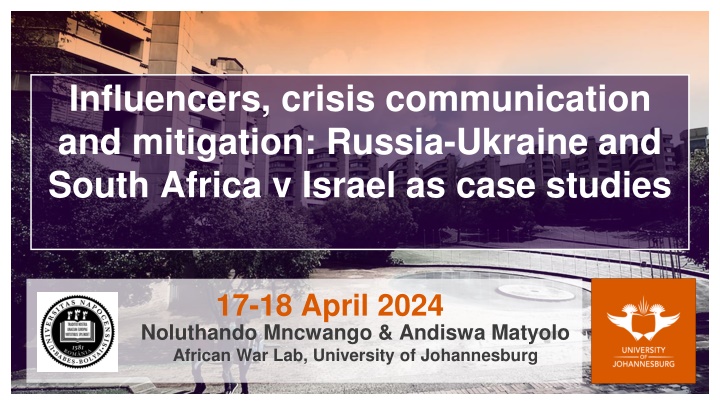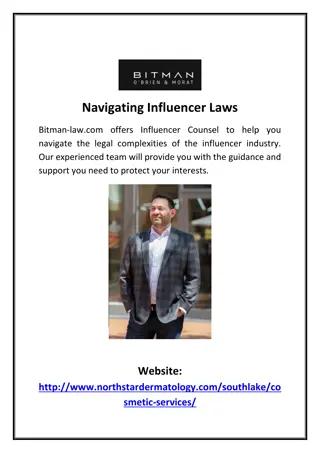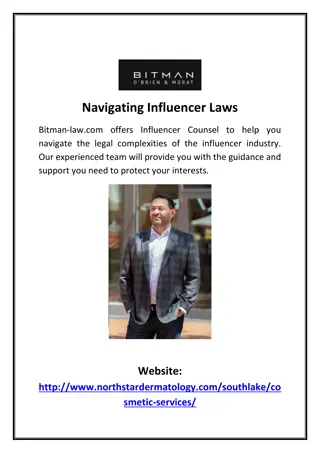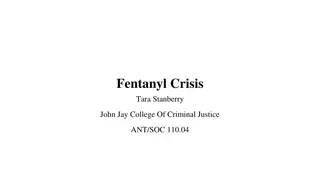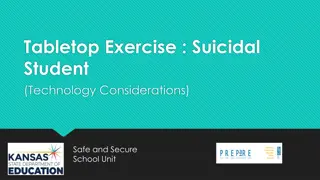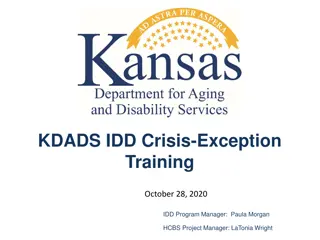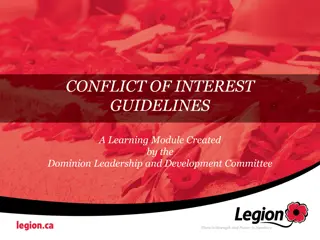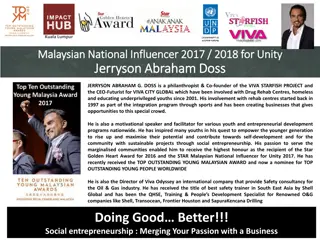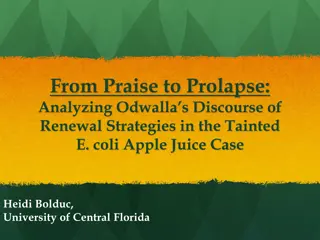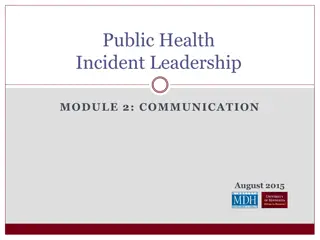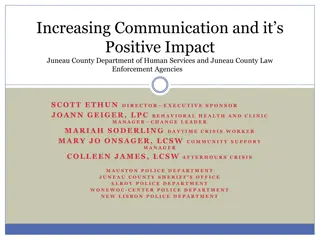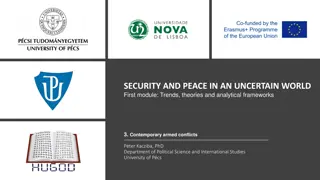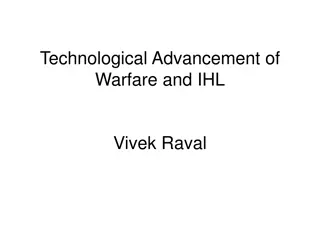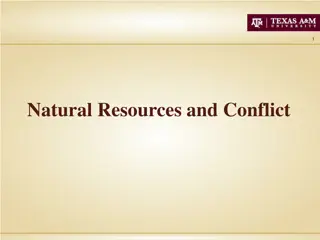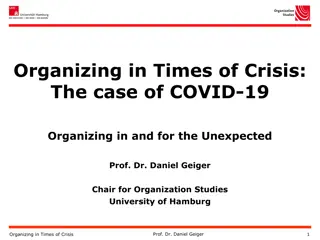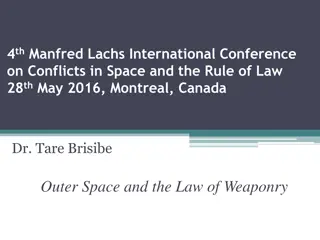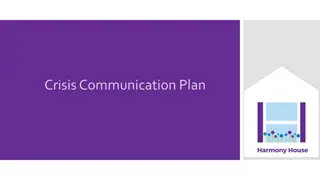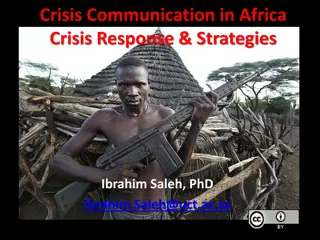Modern Crisis Communication Strategies in International Conflicts: Case Studies and Influencer Impact
Explore the significance of using modern technology, especially social media, in crisis communication and mitigation strategies, focusing on the Russia-Ukraine and South Africa-Israel conflicts. The presentation delves into the role of influencers, state actors, and netizens in shaping humanitarian efforts and communication dynamics. Discover how hashtags, celebrity involvement, and social media evidence play crucial roles in managing crises effectively.
Download Presentation

Please find below an Image/Link to download the presentation.
The content on the website is provided AS IS for your information and personal use only. It may not be sold, licensed, or shared on other websites without obtaining consent from the author.If you encounter any issues during the download, it is possible that the publisher has removed the file from their server.
You are allowed to download the files provided on this website for personal or commercial use, subject to the condition that they are used lawfully. All files are the property of their respective owners.
The content on the website is provided AS IS for your information and personal use only. It may not be sold, licensed, or shared on other websites without obtaining consent from the author.
E N D
Presentation Transcript
Influencers, crisis communication and mitigation: Russia-Ukraine and South Africa v Israel as case studies 17-18 April 2024 Noluthando Mncwango & Andiswa Matyolo African War Lab, University of Johannesburg
Overview of Presentation Significance of the research Case Studies: Russia-Ukraine War Israel-Palestine War & South Africa s involvement Findings Conclusion African War Lab (Politics and International Relations), University of Johannesburg 18/04/2024 2
Significance of the research The use of modern day technology in crisis communication and mitigation (social media) Notable movement in communication from state officials and news outlets to netizens Netizens participation in humanitarian efforts (hashtags, crisis communication & mitigation) Additionally, it highlights the admissibility of social media evidence in crisis communication and mitigation strategies African War Lab (Politics and International Relations), University of Johannesburg 18/04/2024 3
CASE STUDY 1: Russia-Ukraine war Tensions began in the 1990s following Ukraine s independence Ukraine had ethnic, religious and linguistic division in its regions e.g Crimea (believed it belonged to Russia) Annexture of Crimea in 2014 began conflict, but the war escalated in 2022 following the invasion by Russia African War Lab (Politics and International Relations), University of Johannesburg 18/04/2024 4
Russia-Ukraine (Actors Intervention) State Actors 16 Hour talk in 2015 between Germany, France, Ukraine and Russia for ceasefire (crisis mitigation) = unsuccessful Sanctions on Russia by the U.S.A Non-State Actors (Humanitarian efforts) Influencers/Celebrities - Miley Cyrus (share messages and standings on war) - shared with over 40 million followers on X Ryan Reynolds, Blake Lively, Gigi Hadid, etc. African War Lab (Politics and International Relations), University of Johannesburg 18/04/2024 5
Russia-Ukraine (Actors Intervention) - Cont Ryan Reynolds & Blake Lively (1 million) - for humanitarian efforts Mila Kunis and Ashton Kutcher donated over $20 million and opened a GoFundMe account which they surpassed their goal of 30 million in through their fans - in two weeks Hashtags - provide information, stimulate conversations. #ukraine #russia #standingwithUkraine Are a form of movement and are started by opinion leaders African War Lab (Politics and International Relations), University of Johannesburg 18/04/2024 6
Russia-Ukraine (Actors Intervention) - Cont Hashtags provide information on topics such as the Ukraine- Russia war Audience Audience online interact through reactions and donations Influenced by celebrities and social media influencers they admire E.g Mila Kunis and Ashton Kutcher s successful GoFundMe Compaign African War Lab (Politics and International Relations), University of Johannesburg 18/04/2024 7
CASE STUDY 2: SOUTH AFRICA V ISRAEL South Africa s application for ICJ jurisdiction in December 2023. Calls for intervention by the ICJ for a ceasefire and a halting of the conflict Presented case: Contravention of the Genocide Convention and a consideration of Israel s actions as motivated by genocidal intent. African War Lab (Politics and International Relations), University of Johannesburg 18/04/2024 8
SOCIAL MEDIA AND CRISIS COMMUNICATION First round of oral proceedings: South Africa Presented evidence: Social media statements made by Israeli officials in proving genocidal intent, social media gathered images of the state of Palestine, etc. Illustrating the admissibility of social media evidence and R2P African War Lab (Politics and International Relations), University of Johannesburg 18/04/2024 9
SOCIAL MEDIA AND CRISIS COMMUNICATION (CONT) Evidence gathering methods Mediums of social media evidence: X (formerly known as Twitter) Role of influencers and social media hashtags Use of social media posts as an alternative to ground research-based evidence similar to AU and UN Missions African War Lab (Politics and International Relations), University of Johannesburg 18/04/2024 10
EXTENSIONS OF R2P? Impact and role of social media influencers in protecting Palestinian civilians through crisis communication Individual efforts at reporting on the crisis, providing aid and making awareness on daily developments Acknowledgement of the audience within R2P on the success of the communications of both crises Case study reference: Liberia (2003) - granting of asylum to former President Charles Taylor African War Lab (Politics and International Relations), University of Johannesburg 18/04/2024 11
Findings and Conclusion Impact of Social Media on crisis communication and mitigation is apparent in both assessed case studies. Role of Non-state Actors and Audience is vital on social media and admissible for legal intervention and to a large extent, crisis communication and mitigation. Plays a huge and considerably impactful role. Responsibility to Protect (R2P) extended Evident on all three levels (state, non-state and audience) African War Lab (Politics and International Relations), University of Johannesburg 18/04/2024 12
